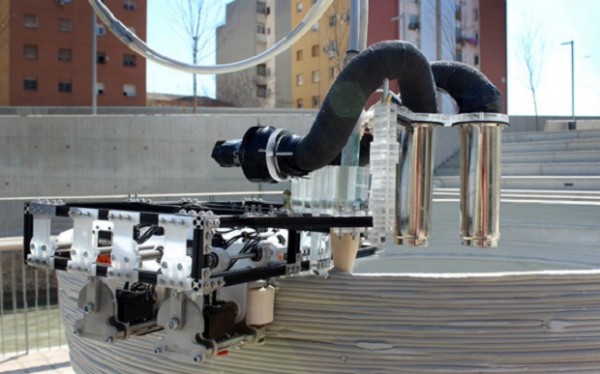There’s a bright future for 3D printing, and it looks like nothing will escape this technology. From various organs to complex constructions, everything will be manufactured this way.
Enrio Dini of dshape, DUS Architects, UCLA, USC/Contour Crafting, in collaboration with Emerging Objects, has developed construction 3D printing robots that take a different approach to creating buildings from scratch. If until now, such robots 3D printed constructions by adding layers in the same way a cake would be made, the Minibuilder developed by Dini and Sasa Joki? employs two tubes to deploy a toothpaste-resembling synthetic marble.
The creators of these robots explained how compressed air is used for forcing out the marble through the tubes. Sasa Joki?, one of the head researchers mentioned that “It’s about any construction robots capable of working in teams to create structures much bigger than themselves. We chose to make these three robots because they are all essential to fabricate the most important building elements like walls and ceilings, but the family of Minibuilders can be endlessly extended adding robots with diverse functionalities, from painting to insulation and beyond.”
Petr Novikov, another contributor to the project, expressed his enthusiasm regarding the role the Minibuilder robots will play in the construction of future buildings: “We’re sure that Minibuilders will play a big and important role in the future of robotic construction. We also encourage other researchers to explore this field. For that reason we shared papers with technical details of our robots.”
One of the best things about the Minibuilder robot is that it theoretically can be made at home. Most of the parts used for building it are open source and can be purchased at any proper hobby store.
With that in mind, it looks like in the not so distant future 3D printed buildings might become the norm. Of course, it depends on how fast such robots can do their work. If it takes longer to 3D print a building rather than raising it using classic methods, the whole technology might not have the best adoption rate ever. Portable, modular approaches such as this one could be replaced by large-scale robots, especially if we’re talking about building extremely complex structures. The resistance of the used materials is yet another factor that needs to be assessed prior to making these robots commercially available.
Be social! Follow Walyou on Facebook and Twitter, and read more related stories about the 3D printed human kidney replacement and the liquid metals that give 3D printing a twist.

 A team of geochemists from University of California, Los Angeles published a report today that contests the widely-held belief that life on this planet began 3.8 billion years ago. The study, published in the journal PNAS, instead argues that life...
A team of geochemists from University of California, Los Angeles published a report today that contests the widely-held belief that life on this planet began 3.8 billion years ago. The study, published in the journal PNAS, instead argues that life...
 A team of geochemists from University of California, Los Angeles published a report today that contests the widely-held belief that life on this planet began 3.8 billion years ago. The study, published in the journal PNAS, instead argues that life...
A team of geochemists from University of California, Los Angeles published a report today that contests the widely-held belief that life on this planet began 3.8 billion years ago. The study, published in the journal PNAS, instead argues that life...










